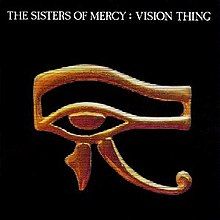
12. Ribbons (Vision Thing, 1990)
This and the title track off Vision Thing are the best double-whammy on any of the Sisters’ three albums. Ribbons is The Sisters’ heaviest song – hats off to Andreas Bruhn - and feels like their perviest. However, if “love is a many splintered thing”, then the violence in Ribbons is purely emotional.
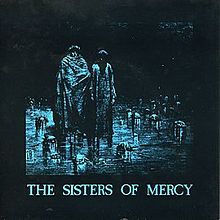
11. Afterhours (Body And Soul 12” single, 1984)
This is the first of Eldritch’s American songs. Afterhours oozes, an evocation of the wee hours in Midtown Manhattan (a room in The Iroquois Hotel, to be precise). Afterhours is clammy with sex and amphetamine. It throbs and tingles, as Eldritch all but whispers his confession: New York is a long, long way from Leeds. It also contains one of Eldritch’s best riffs: this one an eruption of doom-laden slow-motion twang.
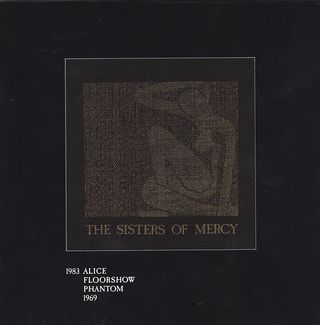
10. Phantom (Alice 12” single, 1983)
Phantom occupies some rarely explored place between Gary Glitter, Ennio Morricone and The Shadows. It is The Sisters’ Rock and Roll Part 2 or Ghost Riders In The Sky. Phantom is essentially an instrumental two-hander between Gary Marx’s lead guitar (played with a fork jammed in place of a broken tremolo arm) and Eldritch’s lead drums, which would have made Mike Leander proud.
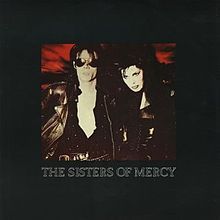
9. This Corrosion (12” single, 1987)
The road of excess leads to the palace of wisdom… Eldritch pitched this to Jim Steinman as needing to sound like a disco party run by the Borgias. Even that doesn’t cover the extent of the overkill on display here: it sounds like the Red Army Choir, Cabaret Voltaire, a heavy metal guitarist and several David Bowies all conspiring to get on the cover of Smash Hits. This Corrosion makes the Ride Of the Valkyries sequence in Apocalypse Now sound like a 4-track bedroom demo. And all that just to have a dig at Wayne Hussey. This Corrosion was powerful Psy-Ops indeed.
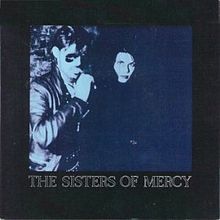
8. Lucretia My Reflection (Floodland, 1987)
Lyrically, Lucretia My Reflection is Eldritch’s recognition that Patricia Morrison made The Sisters more formidable than ever. Lucretia is driven by a bass riff of such absolute simplicity and authority, that an actual chorus is redundant. In fact, it is insidious enough to sustain the entire song, which was catchy enough to get Eldritch on Top Of The Pops singing about “hot metal and Methedrine”. It also contains Eldritch’s neatest encapsulation of being in The Sisters of Mercy: “A hard reign held up by rage” – one of the brazen Dylan twists on Floodland.
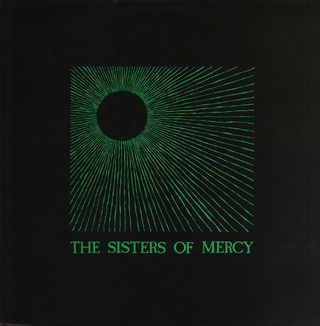
7. Temple Of Love (12” single, 1992)
This has all the pleasures of the 1983 original – an utterly golden riff, a chorus that kicks in, a cynical torrent of lyrics – with a huge amount of WEA’s money thrown at it. Every penny can be heard in its eight minutes-plus: wonderful vocals from Ofra Haza (and from Eldritch), rich synths, chugging Metal guitars. Temple Of Love is an anti-love song wrapped inside an enigma inside a gargantuan Eldritch production, his finest work behind the desk. Fast, furious, danceable, Fatih Akin was right to use this version in “Gegen Die Wand”: gonzoid, glowering, sexy, deluxe amphetamine filth.

6. Alice (Double A-side 7” single, 1982)
The 808 drum machine that is on Alice would become synonymous with hip-hop and house music. Alice is also a dance record, albeit of a different kind, yet one virtually contemporaneous with Bambaataa’s Planet Rock. Alice has endured, a kind of Transpennine Blue Monday. Both are instantly recognisable from their ultra-simple opening drum patterns, both floor-fillers for nearly 40 years. The deathless one-string guitar riff probably grew out of a love of The Cramps, the driving down-stroke bass line out of a love of Hawkwind. The lyrics unusually came easily to Eldritch: Alice took 10 minutes to write; on a sofa in Leeds, on a Woolworth’s guitar.
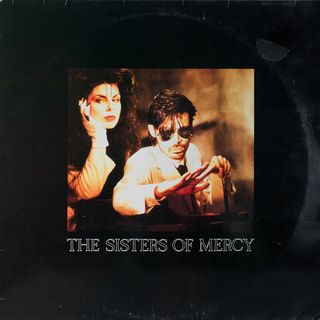
5. Dominion/Mother Russia (Floodland, 1987)
This is Floodland's opening diptych that elides dreams of inter-personal and political domination. Eldritch, himself not averse to the occasional “sneer of cold command” repurposes Shelley’s Ozymandias to point out the futility of both. In essence, this is The Sisters at their most Gang of Four: groove + back-up singers + lit-referencing disquisition on human relations in an Age of Imperialism. By the end of Mother Russia, Eldritch has mashed-up of a Cold War-era mini-treatise on the geopolitics of West Berlin and fantasised about the fallout from Chernobyl raining down on Americans “stuck inside of Memphis with the mobile home” – Dylan, again. And of course, it’s a pop song you can shake your ass to. It was accompanied by The Sisters’ best promo video by far: Morrison and Eldritch looking magnificent in Petra, but possibly in Greeneland or Under The Volcano. Eldritch, minus swordstick, but with white suit and beard, went on Top Of The Pops, seemingly channelling Bryan Ferry.
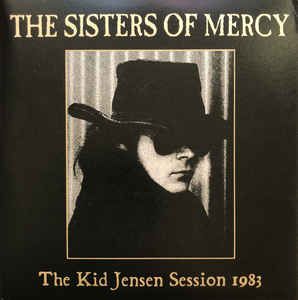
4. Jolene (Jensen Session, 1983)
Unlike Gimme Shelter, The Sisters came to praise not to bury the original. Their version of the wonderful Dolly Parton original is properly camp, hilarious and profoundly groovy. In part, Jolene was intended to rebut any argument that lumped Eldritch in with (what Simon Reynolds has termed) “the hunky Goth singers” like Peter Murphy and Ian Astbury, or indeed the entire phallo-centric tradition in rock: the leather-trousered, crotch-thrusting that formed a large part of Eldritch’s stage act at the time was not be taken straight. Drenched in over-driven guitars, four-on-the-floor drums with a discoid high-hat, Jolene was also The Sisters’ utter provocation to anyone with a po-face who thought they were the new Joy Division.
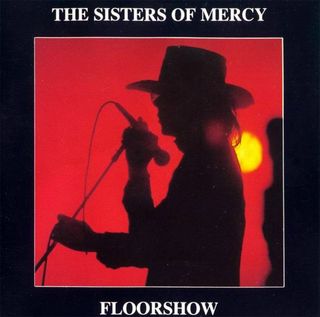
3. Floorshow (Double A-side Single, 1982)
Floorshow is an outrageous melange of In Zaire, Lemmy-like fuzz bass, The Wasteland and possibly Stormbringer by Deep Purple, all at the service of a haughty and stinging attack on the clubs and discos of Leeds, pitched as an eye-witness account of the death of Western culture. Drums, bass, guitar, voice: all sounded so, so good, especially Doktor Avalanche (forever the name of The Sisters’ drum machine whatever the technological advances). Floorshow was made - like Alice - with John Ashton of The Psychedelic Furs over a couple of weekends in that pocket battleship of an 8-track studio in Bridlington. With huge irony, a great chunk of Floorshow filled dance-floors during Leeds’ House music boom a decade later. Dave Beer and Ali Cooke, the two Sisters über-fans who created the legendary Back To Basics club nights sampled Floorshow on Floored in 1993, which made the link between The Sisters, drum machines and the dance-floor explicit.
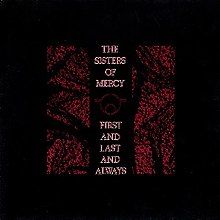
2. Some Kind Of Stranger (First And Last And Always, 1985)
Andrew Eldritch and Gary Marx had started The Sisters of Mercy together in 1980. They had begun inauspiciously with Damage Done and Watch, but they ended with this brilliance. Some Kind Of Stranger, which closes out First And Last And Always, marks the end of their recorded output together, their personal relationship in utter disintegration at the time. Yet some vestigial connection remained: it cannot be co-incidental that Eldritch summoned up his greatest lyrics for Marx’s best music. The collision of Eldritch’s dissection of his own promiscuity over Marx’s transliteration of The Wedding March is alone so ironic that Eldritch seems to have been freed to offer up some of his most openly confessional lyrics, albeit ones that clearly draw on Don’t Sleep In The Subway by Petula Clark. Hussey’s playing of the guitar figure that runs through the verse is superb, as is Marx’s of the higher guitar line that dips in and out of Roxy’s If There Is Something. Some Kind Of Stranger is therefore simultaneously devastating and witty.

1. Emma (Dominion 12” single, 1988)
Hot Chocolate’s version was already a slow-burning, sparse heartbreaker, The Sisters made theirs even slower, even sparer and even more of a tear-jerker. Emma is incredibly moving, and yet such fun. It is even more perfectly camp than Jolene; a masterpiece of artifice and exaggeration, yet deeply and truly emotional. Emma finally made it onto record in 1988 when Eldritch was effectively a solo artist, but its arrangement was essentially the one The Sisters had played live almost every gig as a band between 1983 and 1985. This version was a hybrid: all the instruments in the studio, Eldritch live in the Kilburn National Ballroom with a full lighting rig, monitors and smoke. Extraordinarily indulgent, but the result is a total triumph: Eldritch delivers his greatest vocal performance, equalling the drama and intensity of Bowie on Heroes or Wild Is The Wind, all the while backed up by the ghosts of the band he no longer had.
Mark Andrews’ book on Leeds and the rise of The Sisters of Mercy, Paint My Name In Black And Gold, has just 100% funded with Unbound. It – and other special editions – can be pre-ordered now.
